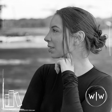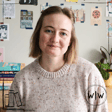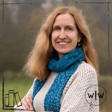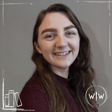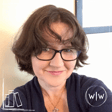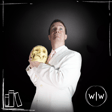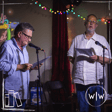Become a Creator today!Start creating today - Share your story with the world!
Start for free
00:00:00
00:00:01

242 Carmela Dutra | Cosy Mystery Author and Indie Picture Book Writer/Illustrator
Cosy mystery author and indie picture book writer and illustrator Carmela Dutra joins us this week to chat about how she persevered through years of querying before landing an agent and a two book publishing deal!
Find out more about IngramSpark: www.ingramspark.com/learnmore
Support the show on Patreon! 💖 And get extended episodes, ad-free and a week ahead of everyone else. 🙏
For audio listeners:
Listen to The Chosen Ones and Other Tropes, Jamie's other podcast with Melissa Welliver and Naomi Gibson! 📚
Follow on socials! 🥳
Transcript
Introduction and Guest Welcome
00:00:00
Speaker
This episode of the right and Wrong podcast is sponsored by Ingram Spark. Stay tuned to hear more and enjoy the episode. Ooh, a spicy question. I love it. Because the writing is sort of everything, right? Like you can fix plot holes, but if the writer... So some readers love that and some readers are like, but I wanted more of this. So it's kind of, it's kind of a gamble.
00:00:20
Speaker
Hello and welcome back to the Right and Wrong podcast. On today's episode, I am joined by an indie picture book author and illustrator whose debut cozy mystery novel comes out very soon.
00:00:31
Speaker
It's Carmela Dutra. Hello. Jamie. Thank you so much for having me. I'm so excited to be here today. Thanks so much for coming on.
Carmela's Debut Cozy Mystery
00:00:38
Speaker
um Let's jump right in and talk about ah your upcoming novel, A Murder Most Foul, comes out September 9th in the UK and the US.
00:00:47
Speaker
Tell us a little bit about it. This is my debut cozy mystery novel and it's set about ah paternal twins, Beth and Seth Lloyd, who inherit their late aunt's chicken-themed food truck.
00:00:58
Speaker
And Beth gets the brilliant idea to enter their truck into a food truck reality show cooking competition. And the competition takes a deadly turn when one of the contestants is found dead in the back of his truck. So the twins have to slew their way through the breadcrumbs to find out what's really going on behind the scenes of this reality TV show before one of them ends up on the chopping block.
00:01:25
Speaker
Sounds good.
Pandemic Inspiration and Genre Shift
00:01:26
Speaker
i'm I'm very much enjoying the current sort of um enthusiasm towards cozy crime azure as a genre. And I love the addition of food as a big theme into it.
00:01:38
Speaker
um I know that you to do picture books and stuff. so So where did this novel come from? What was the inspiration? i did i actually always wanted to write something more than just a thousand word picture book. But at the time, I never really thought that I i had enough creativity to do something that large.
00:01:53
Speaker
And I think it kind of fell into that area where most people during the pandemic, we had a lot of free time. And I'm like, okay, well, let me just do something else. And I wrote a horrible sci-fi novel.
00:02:04
Speaker
But and i don't know why I wrote sci-fi because I don't even really typically read too much sci-fi. But i did that. And it ended up giving me the, I guess, the creative freedom, the the permission, so to speak, to be able to do this. Like, okay, I can do this. I can write this.
00:02:20
Speaker
And it was, ah queried. that novel to agents. had a handful of agents do a full request for it, but they all came back with the same response. There was too much comedy in my sci-fi book, and there was also already mystery that I was weaving into it. So I had about three agents suggest maybe I consider trying my hand at cozy mysteries since i already kind of was leaning that way within the sci-fi world and what I had wouldn't market towards sci-fi. And it was like a light bulb moment because that's what I read. 80% of my bookshelf is mystery and cozy mystery.
Family Inspiration and Writing Style
00:02:57
Speaker
So I'm like, yeah, let's just do that. Let me just write a cozy mystery. And the twin element and the chicken element came from ah phone call with my grandmother because she was an identical twin. and And she was calling me to complain about her sister and one of their recent ridiculous arguments that they were having.
00:03:14
Speaker
And I was at a chicken restaurant when I got the phone call. So afterwards, when I hung up, my husband was like, what what was that all about? He go, you know what grandma's like. And so I told him the story and he's like, oh, you should write something about that. i'm like no, I'm like, if I do that, then they're going to kill each other. and then I was like, oh, hey, this could work. And that's that's how it all kind of came together at that point.
00:03:34
Speaker
Oh, wow. I wouldn't have thought when you hear this not to be based loosely on and sort of true events to inspiration. Yeah, right. I know. Yeah. um But i mean, that's, that is what a lot of it comes back to. I mean, that is how what so many authors do say a lot of stuff gets influenced by their daily life. And that is, I have found to be true, um especially my main characters, they are loosely based off my grandmother, who was an identical twin.
00:04:00
Speaker
Unfortunately, they have both since passed away. ah but i took a lot of what I saw growing up and twins run in my family and twins run in my husband's family. So I took a lot of those elements from the different twins around us and their constant bickering and the way that they they love each other so much, but they also like, they just want to kill each other at the same time because they're they're always together.
00:04:21
Speaker
And I'm like, that works so well for my characters.
Crafting and Querying Experience
00:04:24
Speaker
And it did. So it just naturally weaved its way into my story and that helped with the comic relief in the more serious areas.
00:04:32
Speaker
Yeah. Okay. That makes sense. And it's good to have something relatable that you can touch on as inspiration. I'd love to talk about the, you said the the the sci-fi that you wrote before this, and that was, you know, you suddenly had the free time in lockdown. lots of people did.
00:04:45
Speaker
Was that the first time you'd ever written a novel, that sci-fi? Yeah, it was. It was kind of scary, a little overwhelming, but it was a lot of fun. Once I finally got past that hump of okay, this is too much. I can't do it and then I was like, no, wait, I can do this.
00:05:00
Speaker
I can keep going. So it was it was my first and it's all it was also pretty bad, but it's okay. It's what got me there. Yeah. I think yeah I've said this many times. It's like for a lot of authors, the the way that you really learn how to write a novel is to to write one first.
00:05:15
Speaker
And then that's kind of the the teething process for learning how to do it. Yeah. And I even learned so much, even with this, my debut that's coming out, What I originally queried to agents and what I signed with my my literary agent is is like a complete 180. She taught me so much how to plot and how to build a story structure and how to make sure that I'm hitting those all of those points and getting those red herrings in.
00:05:43
Speaker
And I'm still learning as I go on. I just finished book two in the series and my editor is still teaching me stuff. And i'm this is going to be an ongoing process each time I'm going to learn something different.
00:05:54
Speaker
and take away something else that's going to help improve my craft. Yeah, absolutely. it's yeah it's it's something You keep practicing on it and you keep going better and better. I think no matter how much you've written or how many stories have been published.
00:06:06
Speaker
In terms of agents, you said you queried. was it Was it a long querying process or did it happen quite fast? I spent about three years. So I started with my sci-fi novel and that was also, I was still writing picture books at the same time. So I had a recommendation from a friend who was signed with an agent that she put in for me. So I sent her my picture book and then I queried my sci-fi overall between starting with around my sci-fi until I signed with my current agent, Lindsay, it was three years
00:06:43
Speaker
In this particular manuscript, what I faced 197 rejections. Wow. That's a lot. Yeah. i was it I was very close to shelving it. I was at that point where I was like, I don't know who else I can i can query.
00:06:56
Speaker
um And I was also, through the process, I learned a lot about, you know, just because an agent represents mystery doesn't mean they represent all the different categories within mystery because it's such a large umbrella.
00:07:08
Speaker
And like you had even mentioned about the food element. Yeah. Cozy culinary mysteries are a huge thing and not all agents represent culinary cozies, which is what I
Editorial and Collaborative Process
00:07:17
Speaker
write. um right But yeah, my the agent that I have, she's amazing. And she i didn't even realize that I was gonna end up with her because at the time when I queried her, my iu i used Query Tracker. That was one of the sites that I use.
00:07:32
Speaker
It actually closed out my query after 120 had queried in October. so i had queried her in october of 22. And then I got a reply from her in June of 23, asking for the full request.
00:07:47
Speaker
And that's what started our relationship there. Okay. So almost 200 rejections over, over three period, three years, quite a long period of time.
00:07:58
Speaker
Were you, were you constantly kind of tweaking and changing the cover letter in the manuscript as you were submitting it, or did you just lock it in and just were sending it? Oh no i was always I was always adjusting it.
00:08:09
Speaker
There were times where I'm oh my gosh, take this away from me. So I stopped touching it. But i did I did take feedback that I was getting from agents. And that was something I was really fortunate to receive was a lot of personalized feedback, which I know is not always common for authors when they're querying.
00:08:25
Speaker
So I did read each of those query letters. And then when I noticed that there was ah repeating comment happening, i' like, okay, i got to look at this. there Something is happening and they're telling me something.
00:08:37
Speaker
So when I noticed that ah my pacing was too slow in this area, I started working on it. And I also had a ah handful of agents even edit parts of my manuscript to show me what was missing, to show me what needed to be adjusted, which was really helpful.
00:08:52
Speaker
And I'll always be thankful to them because they helped me along the way to keep adjusting and to keep growing while I was trying to find my agent. Yeah, to be honest, it's difficult querying and it's different length of time for everyone. But I think people will be glad to hear that like you stuck at it, you persevered and like you found your agent and obviously now you found your publisher um ah as well.
00:09:15
Speaker
Once you did so sign with Lindsay, your agent, did things move quite quickly in terms of submissions and then finding your publisher Crooked Lane books? Or was that also and kind of another waiting period?
00:09:27
Speaker
So after I signed with Lindsay, we spent almost a year having to completely restructure my novel. There was a lot that needed to be worked on. And I knew that going into it. And she was honest with me about that. we um We started talking in June.
00:09:40
Speaker
And she emailed me regularly to tell me where you know how she felt about the manuscript, what needed to be adjusted. And so she ended up sending it back to me as a um r and r ah revision and resubmit, but she left that open ended. I could take as much time as I needed. and She wasn't going anywhere.
00:09:58
Speaker
So I did everything she asked. I'm like, okay, this is where I'm at. This is as good as I can get it on my own. I thanked her for the opportunity. And she replied back with, I think was like three weeks and she offered me representation, but she was upfront and told me it's going to need still a lot more work.
00:10:13
Speaker
We're going to need to fix a lot of things. And I was okay with it. i'm like, let's do it. So we spent almost a year because her goal was between the two of us.
00:10:24
Speaker
and my my agent is a former senior literary editor. She used to work at Amazon Books. She worked at Penguin. She was all over the place. So she she knew what she was doing.
00:10:35
Speaker
And she wanted to make sure that my book, when it got rejected from editors, because it will get rejected, that it was going to be simply because it just wasn't what they wanted, not because there was problems with story structure or anything with the writing.
00:10:50
Speaker
And that was the case. We went on submission and i moved really quick on submission, but I do believe so much of that was due to all of the backend work that her and I did together because we really reshaped that story from what it originally was.
00:11:05
Speaker
Okay. So you were, yeah and you were very open to the editing, um, to, to like hearing her opinion, obviously, you know, like you said, she's got a very strong career in editorial and publishing.
00:11:17
Speaker
Oh yeah. Absolutely on board. There was no pushback against the editing. The only thing that I, so um, that I've said from the beginning is you can kill, kill my darlings, take whoever you need, but do not take my giant chicken.
00:11:29
Speaker
Cause there, there is a giant, but there is a giant chicken suit in my book and it's, it's key to my story. Um, and that's how I've kind of ended up becoming known as this, you know, chicken author. Um, but it works. And that's, that's a big part of the mystery in throughout the series is that is using that chicken suit. I know it sounds crazy, but it really does work.
00:11:49
Speaker
Um, ah but her and I were on the same page. She's like, Oh my God, no, I love that chicken. Nothing is happening to that chicken suit. And then my editor, same thing when we, had our meeting. I'm like, I don't care, kill whoever we need to kill. And we did. We killed off three darlings before my book even got to the point of being published.
00:12:05
Speaker
And I'm like, just don't take my chicken suit. And she's like, that's okay. I don't want to take your chicken suit either. So that was my only, my only thing was like, take whoever you need. Just don't take my chicken suit. That's the, that's where we draw the line. Okay. That was
Picture Books and Indie Publishing
00:12:19
Speaker
it. Yeah. Yeah.
00:12:21
Speaker
If you're thinking about publishing your own novel, if you have a story that's ready to be shared with the world, then look no further than IngramSpark. IngramSpark offers everything you need to publish, promote, sell, and print your book.
00:12:35
Speaker
You'll be able to reach millions of readers worldwide with powerful tools created specifically for independent authors. And you can get started for free at IngramSpark.com forward slash learn more.
00:12:47
Speaker
this is i think you mentioned you've you've finished the sequel now this is this was a two book deal yeah yeah this was a two book deal two book deal um that is an ongoing series so there is the potential for more i've already talked with my editor about that so we'll see how things how things go after the release with book one uh so yeah each book is can be read as a standalone they each get wrapped up in your pretty little bow so There's no cliffhangers at the end of my books, but each one will also tie into the other. So if you, if you read book one and you go to book two, you're going to catch in book two references to book one, but you don't have to read book one to start reading out book two.
00:13:29
Speaker
Okay. But presumably it wouldn't, it doesn't work the other way around. If you read book two first and then book one, there's not references. Oh, you totally could. Yeah. oh No, you totally, there's no references to book two and book one. You totally could.
00:13:40
Speaker
I mean, I guess there kind of are some Easter eggs if you know what to look for. But one of my beta readers had brett had not read book one, but i used a new but beta reader for book two.
00:13:52
Speaker
And I warned her right in front of her, like, you will get some. some references to book one and I don't know how that's going to affect you. And she's like, Oh no, it's totally fine. Okay. And so she read book, she, she did the beta reading for book two, no issues.
00:14:04
Speaker
And now she's come back and she's read book one and she's like, Oh my gosh, she's like, this is so fun. I see how, how it ties together. But she also admitted that she didn't need to read book one to read book two that for her didn't make a difference.
00:14:17
Speaker
Okay, great. that's And that's exactly what you were going for as well. that's good to hear. A lot of authors find a sort of particular and unique challenge with writing the second book on a deal or like the second book on contract.
00:14:30
Speaker
Did you find it especially difficult to write the second book or oh just kind of different in the way that it was difficult to writing the first book? No, it was actually a lot easier for me.
00:14:40
Speaker
um Simply because at this point, I had a very good understanding of plotting. So when I wrote book one, I didn't ah didn't plot very well. um I was much more on the Panstein side. And i just ah when I was first doing it, I was like, it's a mystery. Anybody could be the killer. I'm going to find out when the reader finds out. And that really did not work at all.
00:14:59
Speaker
and and But using that very structured style of plotting, and I embraced it fully to like the furthest degree where it almost looks like a mini manuscript when I'm done plotting, it helped me move really quickly.
00:15:15
Speaker
um And i already kind of had had a rough outline. That was something my agent and I talked about, like, where do I see the series going? What are my ideas for the next six books? So all of that's kind of already roughly mapped out. So that helped me to be able to just jump right in and get going.
00:15:33
Speaker
Okay. Okay, cool. I want to talk about more about your process and stuff a bit later on But before we get to the desert island, I wanted to dial it back a bit and, um, I'd love to hear the story about, um, how you got into picture books and and what kind of led to you to start indie publishing your own picture books.
00:15:52
Speaker
So that it was originally as ah gift for my niece and nephew. And that was also me being a totally lazy aunt. because my nephew, my nephew wanted me to draw pictures for him because I, I did illustrate and my niece wanted me to write a story for her.
00:16:07
Speaker
And I'm like, I'm not going to do both of these things separately. I'm like, i don't have time for that. you guys are getting a book. And so that's what I did for both of them. Um, so that was, i did that simply just like for the love of my niece and nephew. I had no intentions of anything happening with any of my books and it was,
00:16:25
Speaker
yet you know, family being supportive. Oh my gosh, you should publish this. You should, you should do something with this. You should do more with this. I didn't have that desire. I wrote another book for my niece and nephew, still didn't really have a desire. And it was my husband who decided i needed to try to publish my books. So he sent query letters out on my behalf.
00:16:43
Speaker
And this was back when you still typed them and put them in the mail and waited six weeks with a self returned envelope. And I started getting rejections and i'm like, why am I getting rejections? I don't even know who these people are. Why are people rejecting me?
00:16:57
Speaker
And then that was when I found out, he's like, oh yeah, I sent some query letters out for you. um So then it was like, okay, well, what did you say? Which was really like, it was so sweet. And I'm just like, oh my gosh, that was like the most, to say supportive is even an understatement because that's how much he believed in my writing.
00:17:13
Speaker
um So I did end embracing it. a I queried. with my picture books and I did end up with a small independent publishing house out um where I'm in California. So out in our state capital, there was ah an individual who had a publishing house out there that I ended up with for a while and things were pretty good. Things were all right.
00:17:36
Speaker
ah they in Due to differences later on, we ended up parting ways and that publishing house ended up going out of business. And at that point, I had just started a new picture book series that was working specifically with schools. It was a STEM picture book about a little girl and her puppy who went to the moon.
00:17:56
Speaker
And it was imagination imagination meets facts. So it was really was a blend of the two. And I used it a lot in schools, to specifically with you know third grade, because that's here when they were learning a lot about the moon.
00:18:10
Speaker
So I was working exclusively with school districts, using, coming in, doing author workshops, reading my book, teaching children the basics of picture book structure, how to, you know, draw your characters, what goes into the elements of a story.
00:18:25
Speaker
And the teachers would use it as part of their curricula because it did meet the common core standards. So I ended up doing two books in the little Katie series and I had plans for more, but that's when pandemic happened and all schools shut down and we tried to do a couple of online visits and it just, it wasn't the same interaction for the kids.
00:18:49
Speaker
And then afterwards, the the state funding that the school districts had been using to bring me in for these workshops wasn't there anymore.
Transition to Adult Novels
00:18:58
Speaker
And at that point too, I had also transitioned into the adult market, which is something that in my heart of hearts, I always wanted to do was write an adult novel.
00:19:08
Speaker
Would you, I mean, obviously you're you're having a great time with your cozy mysteries at the moment and and you've got, you know, the first one's about to come out the second one will will be soon to follow, I have no doubt. Would you, do you have any like desire maybe at some point down the road to, to get back into doing some picture books?
00:19:25
Speaker
Possibly door is not closed. Um, I'm never going to fully close a door to anything like that. I have, that was, one of my happiest moments was working in the schools with the kids and being there. I actually was a professional wedding photographer for 10 years before I started working the school districts. And i ended up closing that business down to focus only in the schools because that's how much I enjoyed it.
00:19:47
Speaker
And it was also, you know, that ended up becoming my new job and it was great. And I also have two boys and they're always asking me to write, write a story for them about dinosaurs and time travel. So I'm sure that that's possible. That's somewhere on my horizon there.
00:20:01
Speaker
Okay. You mean they don't want to hear a story about a cozy mystery involving food trucks? Actually, i well, actually my nine-year-old, he's about to turn 10. did ask me if he could read it.
00:20:12
Speaker
ah So he does have one of my advanced copies. And so I told him, I'm like, you can you can read it. I said, it's about, you know, it's PG-13.
Desert Island Book Choice
00:20:19
Speaker
I said, once you when you get to a a couple of the areas that might be scary for you, I'll you know, I'll tell you to flip those pages and I'll help you there. But there's, there's no nothing graphic on the page. So it'll be okay. okay Now, whether or not he's going to have the, the focus to actually read something that long compared to what he typically reads that remains to be seen. I don't know. We'll see.
00:20:38
Speaker
Yeah, we'll cross that bridge when you come to it. yeah um We are at the point in the episode where I um pack up your things and ship you off and ask Carmella, if you were stranded on a desert island with a single book, which book do you hope that it would be?
00:20:56
Speaker
The Martian by Andy Weir. Now, and I know that I said that I don't read much sci-fi. That is my one of my favorite books. And I also believe that that would be able to maybe help me get off my stranded island. Yeah.
00:21:08
Speaker
Okay. I mean, that's a, yeah, I mean, it's a great book and it almost is like a sort of how-to guide on being able to grow your own herbs and foods to eat. Yeah. So, you know, maybe I'd be able to glean some information there and figure out what I can do, how I can contact civilization. In the meantime, what I can do to take care of myself. And well, if not, at least it's an entertaining read for me.
00:21:30
Speaker
It is, yeah, great choice. You've kind of got the best of both worlds, a fun, exciting read, whilst also, yeah, a bit of do-it-yourself survival kind of stuff. Cool, very cool.
00:21:42
Speaker
um Next up, we are going to talk a bit and more about the writing process. we're going to go a bit more in depth in that. We're going to talk about evolving as a writer. That will all be in the extended episode available on patreon.com slash right and wrong.
00:21:56
Speaker
um And if you ever need, anyone listening to this, ever need somebody to vent to or talk to about querying or being on submission, my DMs online are always open. You can send me a message through my website. You like, I will listen. i will eat ice cream with you. You can vent, you can cry, whatever you need to say. No judgment from me.
00:22:15
Speaker
Oh, well, if there's ice cream involved, I didn't, you't you didn't, you should have led with that. I should have led ice cream, but not popcorn. should leave with popcorn too. Yeah, exactly. um Yeah, I think that's great advice. I mean, sometimes hard to listen to, like hard to hear the truth sometimes. But yeah, you've got to be realistic about this industry. It's it's um like you said, the ones where you hear like they got you know, their first query letter, they got picked up and then the founder publisher within a week.
00:22:43
Speaker
it's It's the unicorn. It's the one in the yeah one in a billion. It's, you know, it does happen, but it's, you're reading about it in on like on the internet because it's so rare that
Episode Conclusion and Patron Shout-out
00:22:53
Speaker
that's happened. That's why you're reading about it.
00:22:55
Speaker
It's not, it's not the common, the common way. um But that's, that's great and great advice. And that brings us to the end of the episode. So thank you so much, Carmela, for coming on and telling us all about your writing and your publishing and your on your writing journey. It's been really, really cool and fun chatting with you.
00:23:12
Speaker
Thank you so much for having me. It's been a great time. And for anyone listening, A Murder Most Foul is out on the 9th of September in the UK and the US. ah You'll be able to find it in all the usual places. And if you want to keep up with what Carmela is doing, you can find her on Twitter and Instagram at Author Carmela, on Facebook at Author Carmela Dutra.
00:23:32
Speaker
And to support this podcast, like, follow and subscribe. Join the Patreon for ad-free extended episodes and check out my other podcasts, The Chosen Ones and Other Tropes. Thanks again, Carmela. And thanks to everyone listening. we will catch you on the next episode.
00:23:45
Speaker
Shout out time. One of my amazing patrons, Lee Foxton, is querying their debut novel. It's a family drama, commercial fiction, along the lines of Jojo Moyes and David Nichols.
00:23:56
Speaker
Fingers crossed. I am rooting for you. Good luck.
